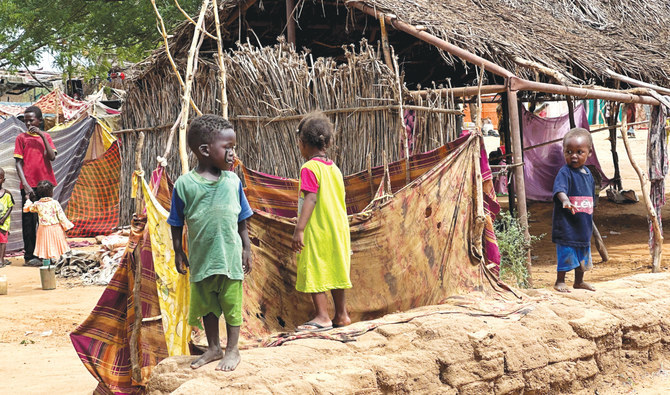NEW YORK CITY: The UN on Tuesday described the humanitarian situation in Sudan as “an absolute catastrophe.”
It said famine conditions have been officially confirmed in the Zamzam camp for displaced persons close to El-Fasher, the capital of North Darfur, where one child is dying every two hours from malnutrition. Famine is probably also present in several other camps for displaced people in and around the city.
“This announcement should stop all of us cold because when famine happens, it means we are too late,” Edem Wosornu, director of operations and advocacy at the UN Office for the Coordination of Humanitarian Affairs, said during a meeting of the Security Council to discuss the humanitarian situation in Sudan.
“It means we did not do enough. It means that we, the international community, have failed. This is an entirely man-made crisis and a shameful stain on our collective conscience.”
More than 26 million people in Sudan now face acute hunger, she said, adding: “That’s the equivalent of New York City times three, full of starving families and malnourished children.”
War has been raging in the country for more than a year between rival factions of its military government: the Sudanese Armed Forces, under Gen. Abdel Fattah Al-Burhan, and the paramilitary Rapid Support Forces, led by Mohammed Hamdan Dagalo, commonly known as Hemedti. More than 19,000 people have been killed since the conflict began in April 2023.
James Kariuki, the UK’s deputy permanent representative to the UN, told fellow council members: “There is famine in Sudan and that famine is entirely man-made.”
He accused the Sudanese Armed Forces of obstructing the delivery of aid to Darfur through actions such as the closing the Adre crossing on the border between Chad and Sudan, which is the most direct route for delivering humanitarian assistance at scale. And he said attacks by the Rapid Support Forces in the region have created the conditions for starvation to spread.
Kariuki called on the warring factions to participate in peace talks in Geneva and engage “in good faith to agree steps to a durable ceasefire, full humanitarian access and the protection of civilians.”
Wosornu said that “hunger is not the only threat people are facing.” The war has displaced more than 10 million people inside Sudan, and more than 2 million have fled to neighboring countries as refugees, making it the largest displacement crisis in the world.
In the past six weeks alone, about 726,000 people have been displaced within and from Sennar State in the southeast of the country as the result of an advance by the Rapid Support Forces into the area.
Sudan’s healthcare system has collapsed, Wosornu added, with two-thirds of the population unable to get to a hospital or see a doctor.
In addition, heavy rains in recent weeks have caused flooding in residential neighbourhoods and camps for displaced people, including in Kassala and North Darfur, increasing the risk of cholera and other waterborne diseases, OCHA said.
“Khartoum, the capital of Sudan, once the beating heart of the country, is in ruins,” Wosornu said, as she voiced grave concerns about war crimes being committed in the city.
She said Sudanese women, and girls as young as nine years old are exposed to “horrific levels” of sexual violence, with “suicide rates among survivors increasing” and “the number of children born out of rape surging.”
Aid workers in Sudan continue to face harassment, attacks and even death. Food, medicine and fuel convoys have been looted. Three trucks have been blocked by the Rapid Support Forces in Kabkabiya, west of El-Fasher, for more a month, OCHA said, depriving malnourished children in the Zamzam camp of the aid they so desperately need to survive.
Humanitarian access continues to be obstructed, said Wosornu, with a recent escalation of fighting in Sennar causing further blocking of the southern route that used to be the UN’s main cross-lines option for the delivery of humanitarian aid from Port Sudan to Kordofan and Darfur.
“Life-saving supplies in Port Sudan are ready to be loaded and dispatched to Zamzam, including essential medicines, nutritional supplies, water-purification tablets and soap,” said Wosornu. “It is crucial that the approvals and security assurances needed are not delayed.”
She told council members that it is still possible “to stop this freight train of suffering that is charging through Sudan. But only if we respond with the urgency that this moment demands.”
She called for an immediate ceasefire and for the warring factions to allow the rapid, safe and unimpeded delivery of humanitarian assistance across the country, using all possible routes.
In the absence of a ceasefire, Wosornu said all involved in the conflict must uphold their obligations under international humanitarian law, adding: “Those who commit serious violations, including sexual violence, must be held accountable.”
She also stressed that more resources are needed to tackle the humanitarian crisis “and we need them now. If we do not receive adequate funding for the aid operation, the response will grind to a halt.”


























